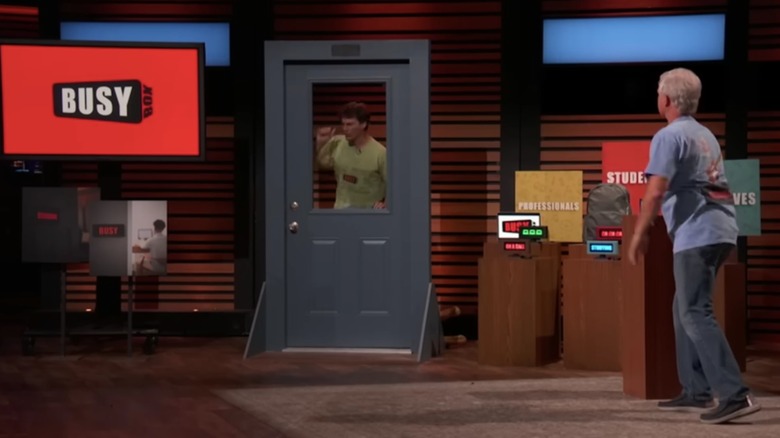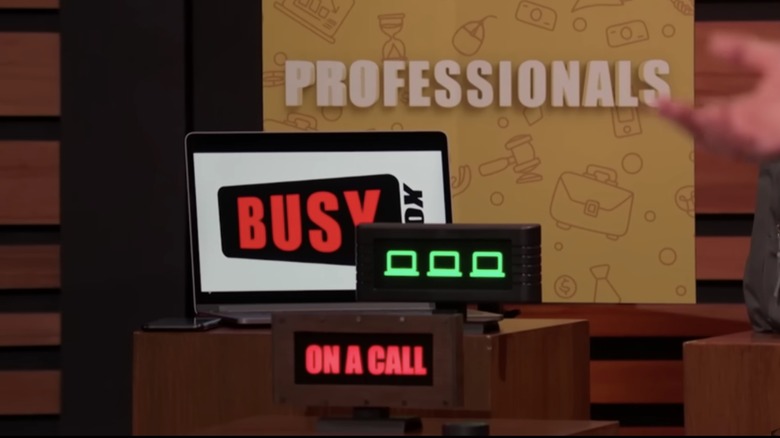Whatever Happened To BusyBox Do Not Disturb Sign After Shark Tank Season 13?
We may receive a commission on purchases made from links.
We know, all too well, the struggles of working from home when someone barges in on your important phone call or video chat. Entrepreneurs Connor Smith and Steve Skillings created the BusyBox to mitigate these worries.
The BusyBox is a wireless light sign with interchangeable screens to display various messages. "Do not disturb," "recording," and "studying" are a few cards you can mount to let the rest of your house know you're occupied. The device connects to the BusyBox app, where you can control the lighting and color. Plus, it syncs with your calendar to automatically turn on when you need it. There's also a digital model that allows users to flash any message and image outside of the standard display cards. It's a desk accessory every home office could use.
Smith and Skillings came into the tank looking for an investment from Mark Cuban, Lori Greiner, Robert Herjavec, Kevin O'Leary, or Daymond John to skyrocket their brand. They offered the Sharks a 15% stake in their company for $200k. However, none of the wealthy investors wanted to get busy with BusyBox.
The Sharks weren't biting for BusyBox
When Connor Smith and Steve Skillings made their "Shark Tank" debut on Season 13 Episode 19, BusyBox had $429,000 in lifetime sales. Their only competition required customers to cut holes in the wall, run electrical wiring, and add a switch, while BusyBox was simple to install and user-friendly. The entrepreneurs' goal was to create a line of productivity products geared to remote workers. The BusyBox had a notable mission and revenue, but the investors lacked interest.
Billionaire Mark Cuban was the first Shark to swim away. He felt the company's mission was too wide-stretched with plans to merge into the wellness space. Lori Greiner, the QVC queen, sang the BusyBox its praises but believed the almost $300 price point would prevent it from being a household name. Cyber security expert Robert Herjavec agreed with Cuban that diving into the wellness space was a far leap from a do not disturb sign. He passed on the opportunity to invest.
Kevin O'Leary, aka Mr. Wonderful, congratulated the entrepreneurs on their success but had no interest in joining the BusyBox company. Fashion guru Daymond John didn't think the company was investable and sided with Greiner that the price was too high. No Sharks took the chance on Smith and Skillings, but the businessmen left the tank with their heads above water.
BusyBox's post-Shark Tank journey
After the episode aired, comments from fans mimicked the Sharks' concerns about the smart sign's price. Some argued paper and a marker could do the same thing as BusyBox, but they'd be on board if the product cost $50 or less. To help with the sky-high price tag Connor Smith and Steve Skillings came out with BusyBox Remote. Instead of using wifi and an app, this version just needs the Bluetooth controller and batteries. It comes with one sign and a command strip for easy mounting.
Although the BusyBox Remote doesn't have all the bells and whistles like their digital and standard models that can sync to your calendar and be controlled with Siri, this is their cheapest model and will cost you $109. However, on sale, you can get the sign for only $49. Since BusyBox's "Shark Tank" appearance, they have been featured in Digital Journal, Spy, and PR Web. The small business is still up and running to provide all your smart sign needs.
BusyBox is still busy with business
Before creating BusyBox, Steven Skillings was the CEO and founding member of JamHub Corporation, BandLab, and Inventive LLC. So it is no surprise that without a "Shark Tank" investor, he still has the skills to keep the company running. You can follow BusyBox on Instagram, TikTok, and Facebook. To get a sign of your very own, you can purchase one on their website or Amazon.
Plus, the BusyBox is branching out from home office accessories. The enterprise has expanded its marketing to encourage customers to use these light-up signs as more than just a do not disturb marker. The company sells blank vinyl slides so you can scribble your unique message or cut the vinyl for a permanently personalized sign. Its site shows BusyBox signs on displays outside one's home as vibrant holiday decorations. You can transform the interruption deterrent into an app-powered nameplate, digital bumper sticker, or locker accessory.
New products are on the way
BusyBox can update your home office or any place that can use a fun, colorful token. The company, bred from the needs of the COVID-19 pandemic, now works to bring touches of light to help you work and live better. "Our smart sign line of products is our first offering and we have a great product roadmap that we feel will help our owners stay focused so they can get more done and have an improved work/life balance," CEO Steven Skillings shared with David Leichner via Medium. "What Fitbit did for exercise, we want BusyBox to do for the productivity and creativity spaces in your life."
The "Shark Tank" alums hope to do just that with their new product BusyBox Pixel. It brings flare to the traditional sign by adding a pixelated display. This model is still in production due to a global digital chip shortage. However, it is expected to be in stock by November 2023 and will cost $200. BusyBox didn't leave the tank with a deal with the company is proof you don't always need a shark to navigate the choppy waters of business.


